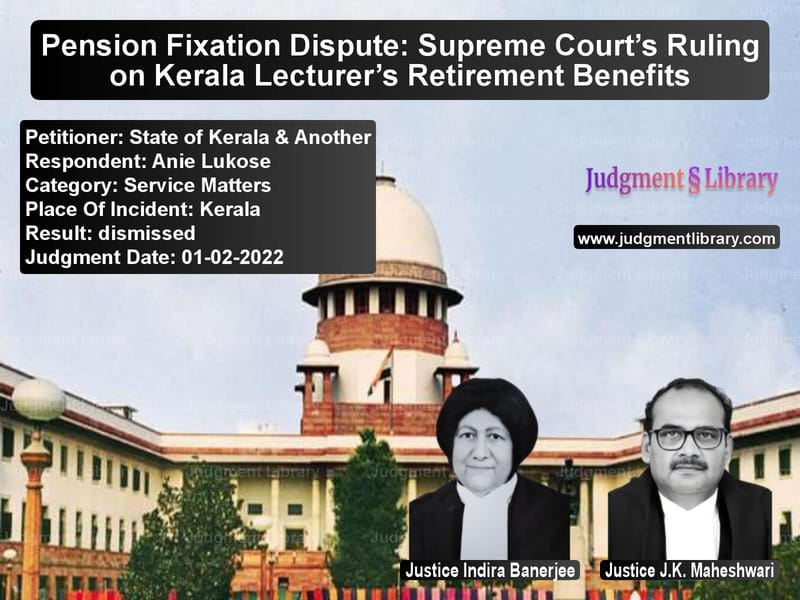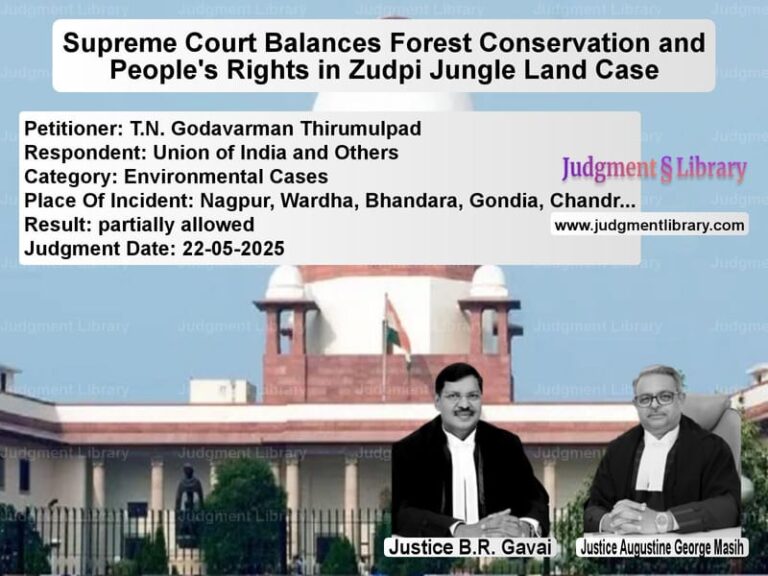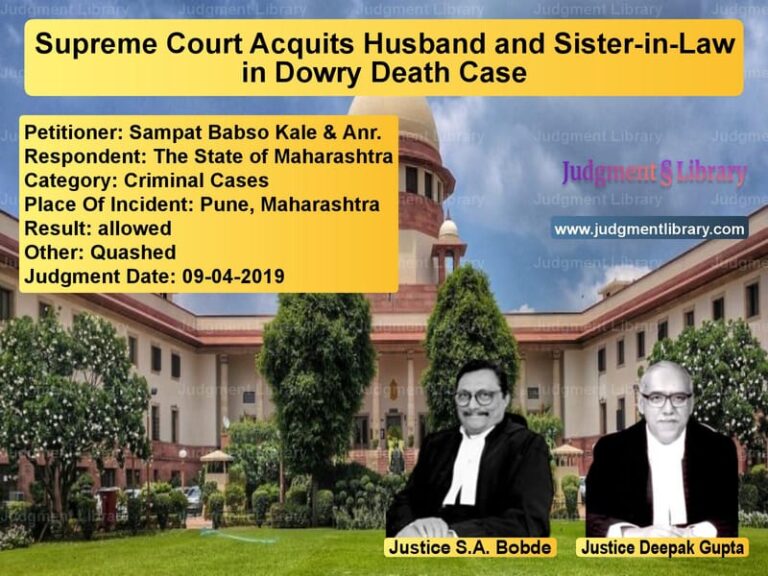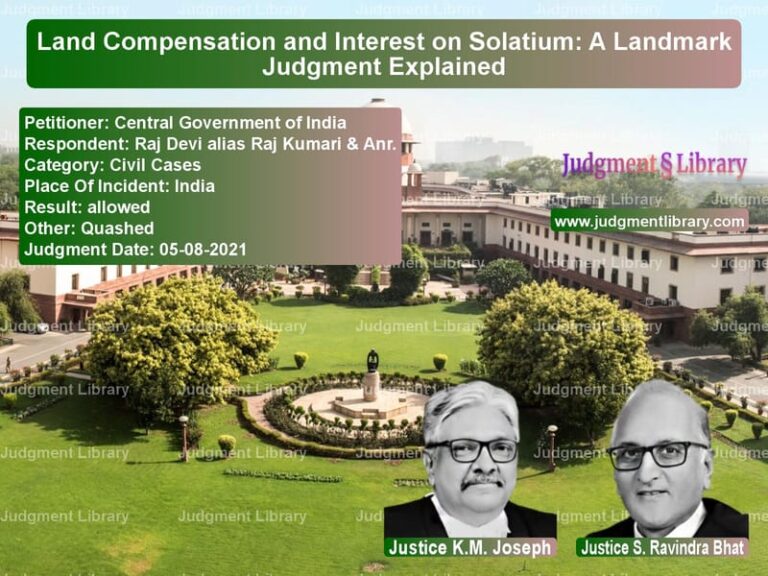Pension Fixation Dispute: Supreme Court’s Ruling on Kerala Lecturer’s Retirement Benefits
The case of State of Kerala & Another vs. Anie Lukose revolves around a dispute regarding the fixation of pension benefits for a retired selection grade lecturer. The Supreme Court had to determine whether the pension should be revised based on the last pay drawn or whether previous errors in pension fixation should be rectified retrospectively.
The ruling clarifies the principles of pension fixation and affirms the role of courts in ensuring retired employees receive their rightful dues.
Background of the Case
The respondent, Anie Lukose, retired as a selection grade lecturer after opting for voluntary retirement on 31st July 2006. Initially, her basic pension was fixed at ₹8,907 per month under the pre-revised scale. However, due to an inadvertent error in the verification report, her pension was incorrectly recorded as ₹7,138 per month.
Following a revision of pay scales, her pension was enhanced to ₹11,127 per month, effective from 1st January 2006. This fixation was later challenged in W.P. (C) No. 30847 of 2012, where the High Court ruled that the pension should have been calculated based on ₹8,907 per month. The State of Kerala did not challenge this ruling, making it final.
Subsequently, the respondent filed W.P. (C) No. 2573 of 2016, seeking to fix her pension at ₹19,333 per month, considering the revised pay structure. The Single Judge of the Kerala High Court allowed the petition, and the Division Bench upheld this ruling. The State of Kerala then appealed to the Supreme Court.
Legal Issues Before the Supreme Court
- Was the fixation of pension at ₹7,138 per month erroneous, and if so, should it be corrected retrospectively?
- Should the revised pension be calculated based on the last pay drawn?
- Did the High Court err in directing the government to revise the pension?
Arguments Before the Supreme Court
State of Kerala’s Arguments
The appellant, the State of Kerala, contended:
- The respondent’s pension was fixed based on verified records, and the subsequent claim for revision was unwarranted.
- As per G.O.(P) No. 230/2012/Fin dated 19th April 2012, pension calculations for employees retiring after 1st January 2006 must follow specific guidelines.
- The respondent was on leave without allowances for nearly two years before retirement, which affected her average emoluments.
- The High Court erred in relying on the last pay drawn rather than the average emoluments over ten months.
Respondent’s Arguments
The respondent, Anie Lukose, argued:
- The High Court’s earlier ruling in W.P. (C) No. 30847 of 2012 had already determined that the pension should be calculated based on ₹8,907 per month.
- The revised pension should have been ₹19,333 per month, considering the revised pay scale.
- The Accountant General had correctly fixed the pension based on the revised pay structure.
- The government was bound to correct the erroneous fixation and provide the respondent with the correct pension amount.
Supreme Court’s Judgment
The Supreme Court upheld the High Court’s decision, ruling in favor of the respondent. The key findings were:
- The High Court had previously ruled that the pension fixation at ₹7,138 was erroneous, and this decision had attained finality.
- The revised pension should be calculated based on the last pay drawn, as per the applicable government orders.
- The respondent’s claim for ₹19,333 per month was justified, as it aligned with the correct pension fixation methodology.
- The government could not deny pension benefits by relying on erroneous records when the mistake had been acknowledged.
The Supreme Court observed:
“The fixation of pension must reflect the correct pay scale and last pay drawn. Errors in verification reports cannot be used to deprive retired employees of their rightful dues.”
Key Observations from the Judgment
- Finality of Court Decisions: Once a court ruling on pension fixation becomes final, the government cannot reopen the issue.
- Pension Calculation: Pension should be based on the last pay drawn, as per applicable government orders.
- Corrections in Pension Fixation: Government authorities must rectify pension fixation errors retrospectively to ensure fair treatment.
- Leave Without Allowances: While leave affects average emoluments, it does not negate the right to correct pension fixation.
Impact of the Judgment
This ruling has significant implications for pensioners and government authorities:
- For Retired Employees: Ensures that pensioners receive correct benefits and are not denied dues due to clerical errors.
- For Government Authorities: Establishes the obligation to correct pension fixation errors even if they were made in the past.
- For Legal Precedents: Strengthens the principle that pension benefits should be calculated based on actual pay scales.
- For Courts: Sets a benchmark for handling similar pension disputes and reinforces the importance of fair compensation.
Conclusion
The Supreme Court’s decision in State of Kerala vs. Anie Lukose is a landmark ruling on pension fixation. By upholding the respondent’s claim, the Court reaffirmed the importance of ensuring that retired employees receive their rightful benefits without procedural hindrances.
This ruling serves as a critical precedent for future pension disputes, emphasizing that errors in verification reports must be corrected to prevent injustice to pensioners.
Petitioner Name: State of Kerala & Another.Respondent Name: Anie Lukose.Judgment By: Justice Indira Banerjee, Justice J.K. Maheshwari.Place Of Incident: Kerala.Judgment Date: 01-02-2022.
Don’t miss out on the full details! Download the complete judgment in PDF format below and gain valuable insights instantly!
Download Judgment: state-of-kerala-&-an-vs-anie-lukose-supreme-court-of-india-judgment-dated-01-02-2022.pdf
Directly Download Judgment: Directly download this Judgment
See all petitions in Pension and Gratuity
See all petitions in Judgment by Indira Banerjee
See all petitions in Judgment by J.K. Maheshwari
See all petitions in dismissed
See all petitions in supreme court of India judgments February 2022
See all petitions in 2022 judgments
See all posts in Service Matters Category
See all allowed petitions in Service Matters Category
See all Dismissed petitions in Service Matters Category
See all partially allowed petitions in Service Matters Category







